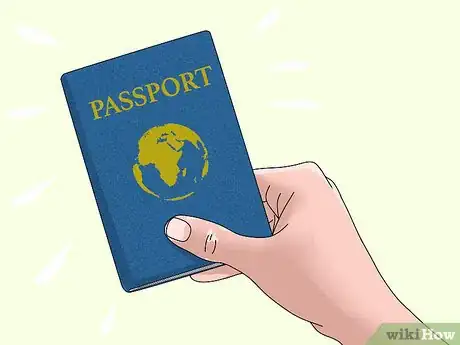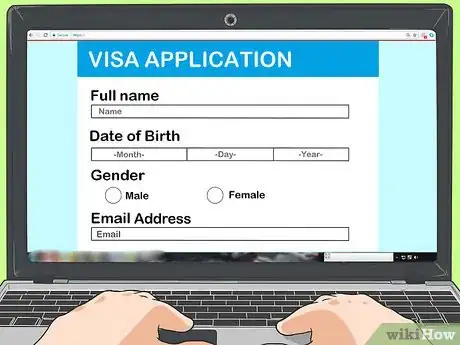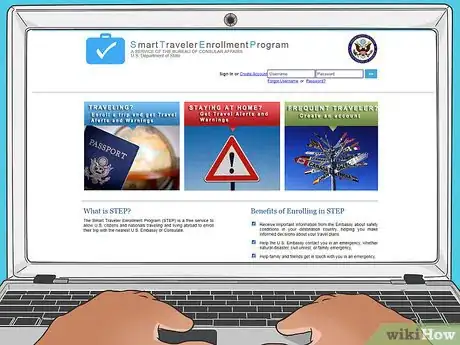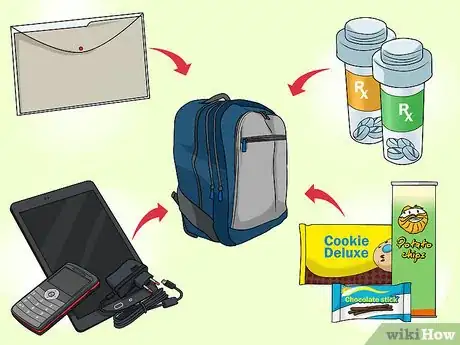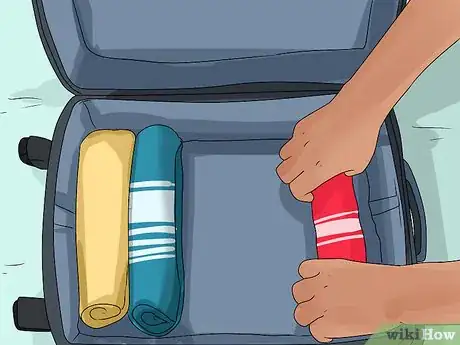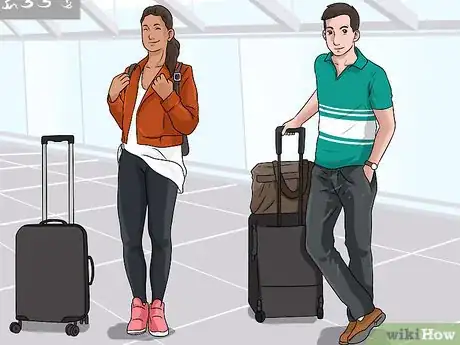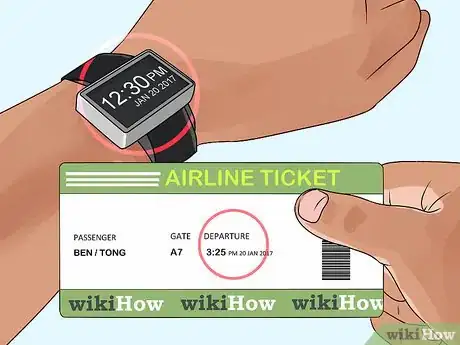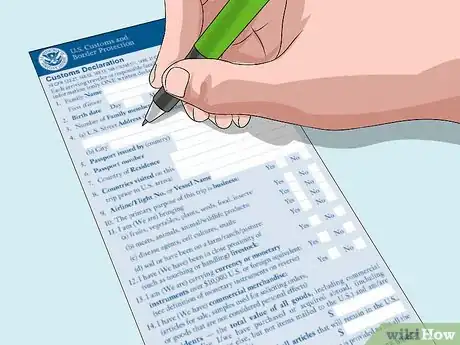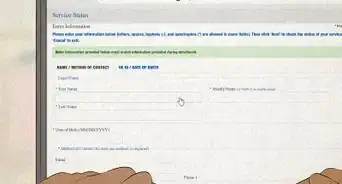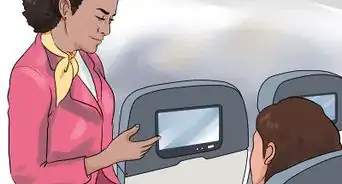This article was co-authored by Amy Tan. Amy Tan is a Travel Planner and the Founder of Planet Hoppers, a boutique travel design team founded in 2002. Planet Hoppers specializes in brainstorming and creating itineraries for dream vacations, honeymoons, exotic adventures, family reunions, and group trips. Planet Hoppers is a TRUE accredited travel agency and a member of the Signature Travel Network, the Cruise Lines International Association (CLIA), and Travel Leaders. Amy earned a BA in Communications and a BS in Physics from the University of California, Davis in 2000.
There are 9 references cited in this article, which can be found at the bottom of the page.
wikiHow marks an article as reader-approved once it receives enough positive feedback. In this case, 100% of readers who voted found the article helpful, earning it our reader-approved status.
This article has been viewed 249,958 times.
Even if you've flown before, preparing for an international flight is an entirely separate experience. You will need to secure documents and make preparations at home that you wouldn't need when flying within your country. Some international trips will require weeks or months of planning beforehand to make sure you have everything you need for the flight.
Steps
Gathering Documents
-
1Get a passport. National passports are essential for those traveling out of their country. You will need to gather evidence of citizenship to qualify for a passport, (including your birth certificate, certificate of citizenship, driver's license, or previous passport). Once you have gathered the required documents, apply by mail or at a passport agency.
- Some countries require passports to have at least six months of validity remaining. If your passport is close to expiring, renew it at least one to two months before you travel.[1]
-
2File for a visa, if necessary. To enter a foreign country legally, you may need a travel visa issued by the consulate or embassy of the country where you're traveling to. Depending on why you're entering the country, you may need either a work visa, student visa, or fixed-term visit visa.[2]
- If you're traveling for leisure purposes, verify whether getting a visa is even necessary - many countries have policies for passport-holders of certain countries where the visa requirement is waived if your whole trip is shorter than a certain amount of time, while others have visa-on-arrival policies where a visa can be purchased at the airport you arrive at for a fee just before the immigration checkpoint.
- Depending on the country, you can submit your application via mail or online. After the information has been reviewed, you may need to attend an interview with a consular officer.
- Plan ahead. A visa application can take anywhere from several weeks to a month to fill out.
- If your visa is rejected, ask for an appeal. Check the consular website of your intended country for information on appeals.
Advertisement -
3Check with your health insurance provider about travel insurance. Ask your health insurance company what injuries or health expenses would be covered internationally. If your insurance company does not provide adequate travel insurance, apply for supplementary insurance from another company for the duration of your trip.[3]
-
4Notify the bank of your trip. Many bank services have fraud-monitoring systems that freeze accounts displaying suspicious activity, like usage in a new location. Traveling to another country may alert these systems if you try to use your credit card. Send a travel notice to your bank via phone or online before you go.[4]
-
5Prepare for money conversion. When travelling internationally, order foreign currency in advance so you have cash while traveling. You'll want to be prepared in case something goes wrong with your credit or debit card. Many banks offer currency exchange options for their clients. Call or email yours before you go to use their services.[5]
- You can also withdraw currency at ATMs all around the world, but this often comes at a high fee.[6]
-
6Complete necessary vaccinations for your trip. Immunizations are often necessary to fly internationally, and you'll need proof of immunization copies. Research what vaccinations are required to visit your specific country. Schedule a visit with your doctor to discuss your travel plans.[7]
- Some immunizations require multiple shots and may need to be started weeks in advance.
- Remember to fill your prescriptions before you pack so you have the medication you need while traveling.
-
7Register with your embassy in case of unexpected emergencies. Most countries encourage travelers to register with their home country before travelling internationally. The embassy will then have a record of your details and be able to offer assistance in unforeseen crises, such as natural disasters or a family emergency while you're overseas. Registration is voluntary but in your best interest.
Packing
-
1Prepare your carry-on with everything you need if you lose your luggage. Bring all necessary documents, medications, electronics, and snacks in your carry-on. Pack a change of clothes and entertainment for the flight as well, especially if your flight is long.[8]
- Put all your valuables in your carry-on to avoid them being damaged or stolen.
- Some passengers like to bring a a first aid kit, just in case any emergencies happen on the plane. Painkillers, anti-nausea medicines, earplugs, and tissues are all great items to bring.
-
2Pack your checked luggage lightly. Your luggage will need to meet weight requirements to avoid extra fees. If you pack lightly, you will have less that could get lost on your trip and plenty of room for souvenirs to bring home.
- Roll your clothes to avoid awkward wrinkling and have more space.
- If you can wear it on the flight, do so instead of wasting luggage space. Dress in layers so you can bring more. Wear your jacket or sweatshirt onto the plane to avoid getting charged for the extra weight.
-
3Omit banned or restricted objects from your luggage. Liquids from outside of the airport and most sharp objects will not be allowed on the plane. Contact the airport your flight's scheduled with to ask which objects are banned. Researching beforehand will help you have a stress-free security experience.[9]
- Different airlines have different allowances or restrictions. Even if you've traveled before, you'll want to contact the specific airline for up-to-date policies.
-
4Pack at least two nights before to avoid rushing. To avoid packing in a rush, finish packing several days in advance. During the last two days, you can double-check to make sure you have everything. Ask yourself preparatory questions: do you have all necessary documents? Did you refill and bring your medications? Is there any necessity you might be forgetting, like credit/debit cards or electronics?
Arriving at the Airport
-
1Wear comfortable clothing for your flight. While you may feel like flying is a special occasion, don't dress up for your international flight. Flights overseas are long, and you'll want to wear loose, comfortable clothes.
- If your flight is especially long, consider packing a pair of sweats for your flight in your carry-on. Change back into your original clothes for the landing.
-
2Check with your airport about car parking rules for international flights. Some airports offer long-term parking rates for your car while you're away. Call or email about the long-term car storage options and the costs of each choice.
- If car storage isn't an affordable option for you, use a shuttle service, hire a taxi, or ask a friend/family member to drive you there.
-
3Arrive at the airport two to three hours before your flight. Check in for your flight as early as possible to go through security and board on time. You'll also have time to use the bathroom or grab something to eat before you depart. While you're waiting for your flight, bring something to relieve boredom: keep a book, journal, or game in your carry-on to entertain you while waiting.
-
4Stay hydrated. Dehydration is a common problem on long flights, which can lead to exhaustion or irritability. Buy a large water bottle to fill up before you board the flight so you can take it in your carry-on.
- Avoid drinking alcohol or caffeine before and during your flight, as both can lead to dehydration.
-
5Declare your items for customs. Most nations require you to mark on an official form what goods you bring with you to their country. Which items you must declare depends on the country. You will likely receive your customs form at the airport and during the flight. Fill it out while on the plane so you are prepared for landing.
- Some countries require a customs form for each person traveling while others require one per family. Check beforehand to know which forms you must fill out.
- Most countries require declaration of: alcoholic drinks, tobacco, animals, seeds, soils, medication, and animal products.
-
6Prepare for jet lag. International flights often involve crossing time zones and long, uncomfortable plane rides. Both can disrupt your sleep schedule. Bring a sleeping mask and earplugs with you, and consider taking an over-the-counter sleep aid to help you adjust to the new time zone.
Packing List for International Flights
Expert Q&A
-
QuestionWhat should you bring on an international flight?
 Amy TanAmy Tan is a Travel Planner and the Founder of Planet Hoppers, a boutique travel design team founded in 2002. Planet Hoppers specializes in brainstorming and creating itineraries for dream vacations, honeymoons, exotic adventures, family reunions, and group trips. Planet Hoppers is a TRUE accredited travel agency and a member of the Signature Travel Network, the Cruise Lines International Association (CLIA), and Travel Leaders. Amy earned a BA in Communications and a BS in Physics from the University of California, Davis in 2000.
Amy TanAmy Tan is a Travel Planner and the Founder of Planet Hoppers, a boutique travel design team founded in 2002. Planet Hoppers specializes in brainstorming and creating itineraries for dream vacations, honeymoons, exotic adventures, family reunions, and group trips. Planet Hoppers is a TRUE accredited travel agency and a member of the Signature Travel Network, the Cruise Lines International Association (CLIA), and Travel Leaders. Amy earned a BA in Communications and a BS in Physics from the University of California, Davis in 2000.
Travel Planner & Founder, Planet Hoppers You may want to bring lip balm, headphones, a phone charger, hand wipes, and a neck pillow.
You may want to bring lip balm, headphones, a phone charger, hand wipes, and a neck pillow. -
QuestionWhat's the first thing I should do when I get to the airport?
 Community AnswerI would recommend going through security as soon as you get there since it often takes the most time.
Community AnswerI would recommend going through security as soon as you get there since it often takes the most time. -
QuestionHow many pieces of luggage can I bring on an airplane other than two carry on bags?
 Community AnswerThis will vary between airlines. You can always call or check your airline's website for more information.
Community AnswerThis will vary between airlines. You can always call or check your airline's website for more information.
Warnings
- Be very serious when dealing with airport security and staff. Jokes about terrorism or explosives are not tolerated, and they can lead to your arrest.⧼thumbs_response⧽
- Avoid advertising your international trip publicly on social media. Strangers may find your house and rob it while you're gone.⧼thumbs_response⧽
References
- ↑ http://www.uspassporthelpguide.com/six-months-validity-rule/
- ↑ http://www.huffingtonpost.com/2013/12/03/how-to-get-a-visa_n_4373745.html
- ↑ http://www.consumerreports.org/cro/2012/06/do-you-need-travel-insurance/index.htm
- ↑ https://bettermoneyhabits.bankofamerica.com/en/saving-budgeting/travel-checklist
- ↑ https://www.nerdwallet.com/blog/banking/exchange-currency-paying-huge-fees/
- ↑ http://travelupdate.boardingarea.com/best-way-get-foreign-currency/
- ↑ https://www.cdc.gov/features/vaccines-travel/index.html
- ↑ https://www.youtube.com/watch?v=P_qCppTlZpI
- ↑ http://www.tsatraveltips.us/can-i-bring-it-on-an-airplane/
About This Article
To prepare for your first international flight, make sure to pack your carry-on with everything you’ll need, such as your passport, medicines, and electronics, in case you lose your checked luggage. Additionally, pack lightly so you can meet the weight requirements to avoid extra fees and have plenty of room for souvenirs. On the day of your flight, dress in loose, comfortable clothes since you’ll be on the plane for a long time. Then, plan to arrive at the airport at least 2 hours before your flight so you can go through security and board the plane on time. For more advice, including how to make sure you have the right documents for your international flight, keep reading!
